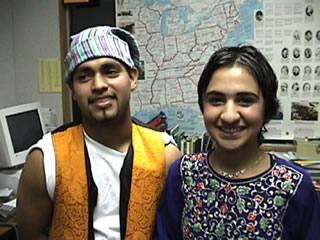Context
Where do I teach?
Content
What are my students learning?
Teaching Practice
What's my approach?
Student Work
Reflections
Resources
Standards
Archive
|
Building Community
I focus on building a sense of community
in the room, so everyone feels safe and you can work. You’re
going to ask kids who’ve never acted before to do some
pretty big things: get angry, pretend they’re crying,
kiss a girl, whatever. So everyone has to feel safe. Some
of that is the sharing, the personal object, some of that is
the theater games, getting everyone to laugh together. I
think laughter’s probably the most important thing in the
room. I think it’s why I like to do this every
year even though it’s such a difficult task, but I love
that there’s so much laughter in the room, much more so
than a traditional class.
I keep trying to find ways in my traditional
English classes to get the sense of community, laughter, to
have kids
to have ownership over their work. You get that
in a theater class. The playwriting class is the same thing. In
that class, I had the kids, after I modeled for them, I had
them teach the major works, they directed each others’ work,
and it was a question of just providing a structure in which
they could then have ownership. But it’s one of the most
satisfying experiences I’ve ever had. A lot of
kids say it’s
the best class they’ve ever had. And I think it’s
because they got a chance to control what they did.
Theater
Games: Getting to know the students
I was trying to cast Prospero in the
Tempest a couple of years ago, and you just need your
best actor to play that. A girl joined us a couple
of weeks into the class– I just heard her, she
had this lovely Spanish lilting tone, and it was clear
how bright she was. I had to make sure she could
do it—first of all, Prospero’s a man, and
I wanted to make sure what she would do with that. That
she had the will to see through this huge project.
There was a theater game called “Make ‘em
Laugh” where everybody lines up against the wall
and one person tries to make them laugh. Another is a
group yawn, a group laugh—helps me to see who’s
loose. So this girl was getting people out and
making people laugh, and at one point she drew herself
up and jumped up in the air and just plopped down—it
was just outrageous! And she got everybody else “out”. There
was just something so daring about it, and irreverent,
that I thought—this is somebody who would understand
the complexity of Prospero, and who’d have the
guts and courage to see it through to the end.
It’s a large role—I’d
even thought about dividing it up and having several
students each perform a scene, and share a large magician’s
cloak. You’re always thinking, “What
if? What can I do theatrically to make this work?” But
she was able to do the whole role, which was obviously
much more effective. |
By design, we’re hoping to grapple with some of the
issues of diversity and community through drama, so it has the
potential to be really exciting. In past years, two
kids wrote plays about coming out, and everyone respected that. We
team-taught, I took my kids and put them together with an acting
class taught by my colleague. His actors were able to
buy into the play, and then we showed them to the school, and
the kids in the lesbian play were applauded, and then the leading
actress, when she came on in another play, she got applauded
at her entrance . Talk
about taking a risk to share your voice, and being supported
by people in the audience! The
kids had a lot of freedom and it was very exciting. When kids
from different backgrounds are mixed in the same class, I
think that writing has to come right out of the tension
in the room, rather than isolated personal lives.
|
Site last updated
February 21, 2006
|

